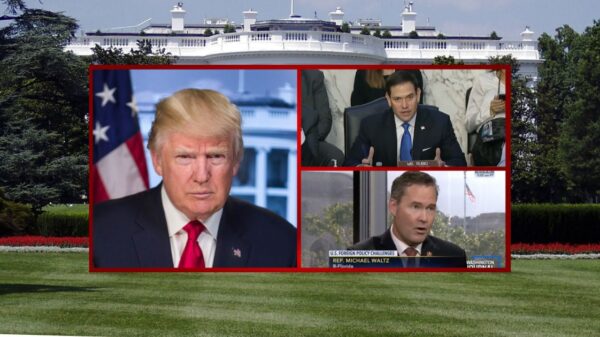On Monday, U.S. Sen. Marco Rubio, R-Fla., sent a follow-up letter to McKinsey & Company’s Global Managing Partner Kevin Sneader after receiving what he termed “inadequate responses” to the senator’s initial July 17, 2020 letter. Rubio’s original letter requested information regarding McKinsey & Company’s relationship with the Chinese Government and the Chinese Communist Party (CCP), including state-owned and state-run companies in China, and what impact those relationships have on McKinsey’s relationship with the United States Government.
The full text of the letter is below.
Dear Mr. Sneader:
I write to once again request information regarding McKinsey & Company’s relationship with the Chinese Government and Chinese Communist Party (CCP), including state-owned and state-run companies in China, and what impact those relationships have on McKinsey’s relationship with the United States Government.
Since my original letter, dated June 17, 2020, I have received two separate responses from Ms. Liz Hilton Segel, the managing partner for McKinsey’s North America operations. Neither letter, despite their length, sufficiently addresses the purpose of my original correspondence: the long-standing and growing concerns surrounding McKinsey’s relationships with the CCP and how those relationships may impact McKinsey’s paid work for the United States Government.
For your convenience, I have attached my original letter and noted below the questions that McKinsey has yet to provide a direct answer to.
Is the Chinese Government or CCP now, or have they ever been, a client of McKinsey & Company?
McKinsey’s July 3, 2020 letter (7/3 letter) states: “to our knowledge, none has ever been a client of McKinsey.”
McKinsey’s 8/20 letter acknowledges “work for state-owned enterprises in China.” Given that, how can McKinsey claim it has never worked on behalf of the Chinese Government or the CCP?
Is it McKinsey policy to avoid working on behalf of the Chinese Government or the CCP?
What precautions does McKinsey take to ensure the “private-sector companies” it works with in China are not controlled by the central government or the CCP?
Have any of those companies been accused of grotesque human rights abuses, such as the detention and internment of hundreds of thousands, if not more than one million, ethnic minorities?
McKinsey’s 7/3 letter also states that “a very small portion of our work in China is for local and provincial governments.”
What precautions does McKinsey take to ensure the “local and provincial governments” it works with in China are not engaged in grotesque human rights abuses?
Is the Central Military Commission of China now, or has it ever been, a client of McKinsey & Company?
McKinsey’s 7/3 letter states: “to our knowledge, none has ever been a client of McKinsey.” McKinsey’s August 20, 2020 letter (“8/20 letter”) states that McKinsey’s “Client Service Risk Committee … does not permit work for defense, intelligence, justice, or policing institutions in countries with an overall score of six or below on the Economist Intelligence Unit Democracy Index, a limitation that currently applies to more than 90 countries, including China.”
What precautions does McKinsey take to ensure the “private-sector companies” it works with in China are not controlled by the Central Military Commission of China?
What precautions does McKinsey take to ensure the “state-owned enterprises” it works with in China are not controlled by, or working on behalf of, the Central Military Commission of China?
Do any of your current or past clients in China work in areas of critical national interest to the United States, including health care, pharmaceuticals, health care equipment and supplies, telecommunications, and military or civil defense?
If so, please provide the following information: a. Name of the company b. Nature of the company’s work c. Nature of company’s relationship with the PRC and CCP d. Duration of McKinsey & Company’s relationship with the company e. Nature of McKinsey & Company’s work on behalf of the company
No answer provided.
McKinsey’s 8/20 letter states, “Given the firm’s contractual and professional obligations to maintain confidentiality, McKinsey is not able to provide information on specific clients or engagements.” However, neither that letter nor the 7/3 letter denied that McKinsey performs work on behalf of Chinese interests in areas of critical national interest to the United States.
Is it McKinsey policy to avoid working with clients in China in areas of critical national interest to the United States, including health care, pharmaceuticals, health care equipment and supplies, telecommunications, and military or civil defense?
Even if covered by previous questions, please detail and disclose any work McKinsey & Company has done in China on behalf of state-owned enterprises or companies that may do work for, or profit from, the detention of ethnic minorities.
McKinsey’s 8/20 letter states: “We will not serve clients that our due diligence indicates are linked to security and law enforcement efforts, surveillance or facial recognition technology utilized in Xinjiang, operate factories or facilities in Xinjiang that may use forced labor or have a footprint in Xinjiang which is subject to external scrutiny.”
What does “due diligence” on the part of McKinsey & Company entail when it comes to screening clients that fall into the aforementioned category, especially given how opaque the links are between many Chinese state-owned firms and their role in these operations in Xinjiang?
McKinsey & Company performs significant work on behalf of the U.S. Government and U.S. Government agencies. What if any safeguards does McKinsey have in place to ensure that work done on behalf of the USG does not inform the work that you do for the Chinese Government?
No answer provided.
McKinsey’s 8/20 letter provides a 286-word overview of the company’s cybersecurity policy. While McKinsey’s response contains references to its work with over 50 U.S. government departments and agencies, including those involved in defense, intelligence, and other elements of national security, the company failed to address fundamental questions on whether McKinsey’s work on behalf of the United States Government informs its work on behalf of any client in China.
The New York Times reported that McKinsey & Company advised the Chinese Government on its Belt and Road Initiative (BRI), which is designed to undermine America’s global economic influence and reduce American companies’ presence abroad. How can the USG and American companies be confident the advice it receives from McKinsey is not compromised by the company’s work with the CCP and other Chinese interests?
No answer provided.
Vox reported that McKinsey & Company was awarded $4.19 million from the World Health Organization (WHO) headquarters between 2017 and 2018. Like McKinsey, the WHO leadership seems to maintain a close relationship with the CCP. Please detail the nature of your work for the WHO.
McKinsey’s 8/20 letter states that it “supported the WHO’s efforts to coordinate and share information across countries regarding the [COVID-19] pandemic and helped launch a new digital platform for health authorities to share information.”
It is now well-established that the WHO helped spread faulty and misleading information provided by the Chinese Communist Party, and actively excluded Taiwan from participating in critical global health conversations at the behest of the CCP.
Did McKinsey ever participate in any conversations regarding the exclusion of Taiwan?
When did McKinsey become aware that the WHO received faulty and misleading information from the CCP?
Did McKinsey ever, inadvertently or otherwise, contribute to the spread of faulty or misleading information provided by the CCP? If so, what steps has McKinsey taken to prevent future spread of misinformation?
The New York Times reported that McKinsey & Company advised opioid manufacturers on how best to increase sales, including by targeting doctors and increasing mail order prescription fulfillment.
Has McKinsey & Company ever: a. Discussed America’s opioid epidemic with a client in China or member of the CPP? If so, please detail the nature of those conversations, including whether they were part of a contract. b. Discussed China’s importation of fentanyl into the United States with a client in China or member of the CCP?
McKinsey’s 8/20 letter states, “Regarding our past work, we are not aware of an instance in which we discussed with a client in China America’s opioid epidemic or the importation of fentanyl from China into the United States.”
Did McKinsey previously perform “opioid related work” in China? Or did it ever work for a client engaged in opioid manufacturing and distribution in China?
In official Chinese newspapers, McKinsey employees have claimed to lead party branches within the company’s offices in China. Please describe the size and role of CCP party committee and party branches within McKinsey.
McKinsey’s 8/20 letter states that it is “unable to answer” because the company “is generally unaware of and does not track the private political affiliations of its employees.”
This answer suggests a profound misunderstanding of how the CCP operates. This is not a matter of employees’ voluntary involvement in civic organizations, but rather the CCP’s involvement in McKinsey’s operation. Even if that involvement was previously unknown, the company should generally be aware of public reporting regarding its employees.
Again, please describe the size and role of CCP party committee and party branches within McKinsey to include the following details:
The names and positions of the McKinsey party committee secretary and the party branch secretaries;
The names of the CCP offices or elements—including but not limited to an organization department, united front work department, and discipline inspection commission—that are subordinate to the McKinsey party committee as well as the names of the McKinsey offices or departments in which they reside;
The role of the McKinsey party committee in business and personnel decisions;
The CCP entity to which the McKinsey party committee reports;
The date on which the McKinsey party committee and each of the McKinsey party branches was established; and,
The date on which McKinsey global managing director and other leadership were informed about the existence and functions of the CCP party committee within the company.
I remain concerned that McKinsey & Company — either wittingly or unwittingly — is aiding the CCP’s attempt to supplant the United States and remake the international community in its own image. We must ensure that firms working on behalf of the United States Government and U.S. companies are putting America’s interests first. McKinsey’s inability to provide clear, direct answers only exacerbates those concerns and raises serious questions as to whether our government — including the Intelligence Community — should continue to use McKinsey’s services.

















